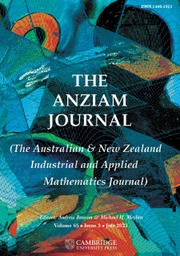Article contents
SCATTERING OF MEMBRANE COUPLED GRAVITY WAVES BY PARTIAL VERTICAL BARRIERS
Published online by Cambridge University Press: 08 June 2010
Abstract
Scattering of membrane coupled gravity waves in deep water by partial vertical barriers is investigated by the recently developed expansion formulae for wave structure interaction problems. The horizontal thin membrane is considered to be under uniform tension and is covering the free surface. The analysis is based on the linearized theory of water waves, and by combining the kinematic and dynamic conditions at the membrane covered surface, one may derive a not so well-posed mixed boundary value problem for Laplace’s equation with third-order boundary condition. The flexible membrane is attached by a spring to the surface piercing barrier, giving suitable edge conditions for the unique solution. The boundary value problem has been converted into dual integral equations with kernels composed of trigonometric functions, which are then solved analytically. The important physical quantities such as reflection and transmission coefficients for both cases of submerged and surface piercing barriers are obtained analytically in terms of modified Bessel functions. It is found that complete reflection or transmission is possible at certain resonant frequencies for the incident membrane coupled waves. Numerical results are plotted and discussed for different values of the nondimensional membrane tension parameter.
Keywords
MSC classification
- Type
- Research Article
- Information
- Copyright
- Copyright © Australian Mathematical Society 2010
References
- 5
- Cited by


